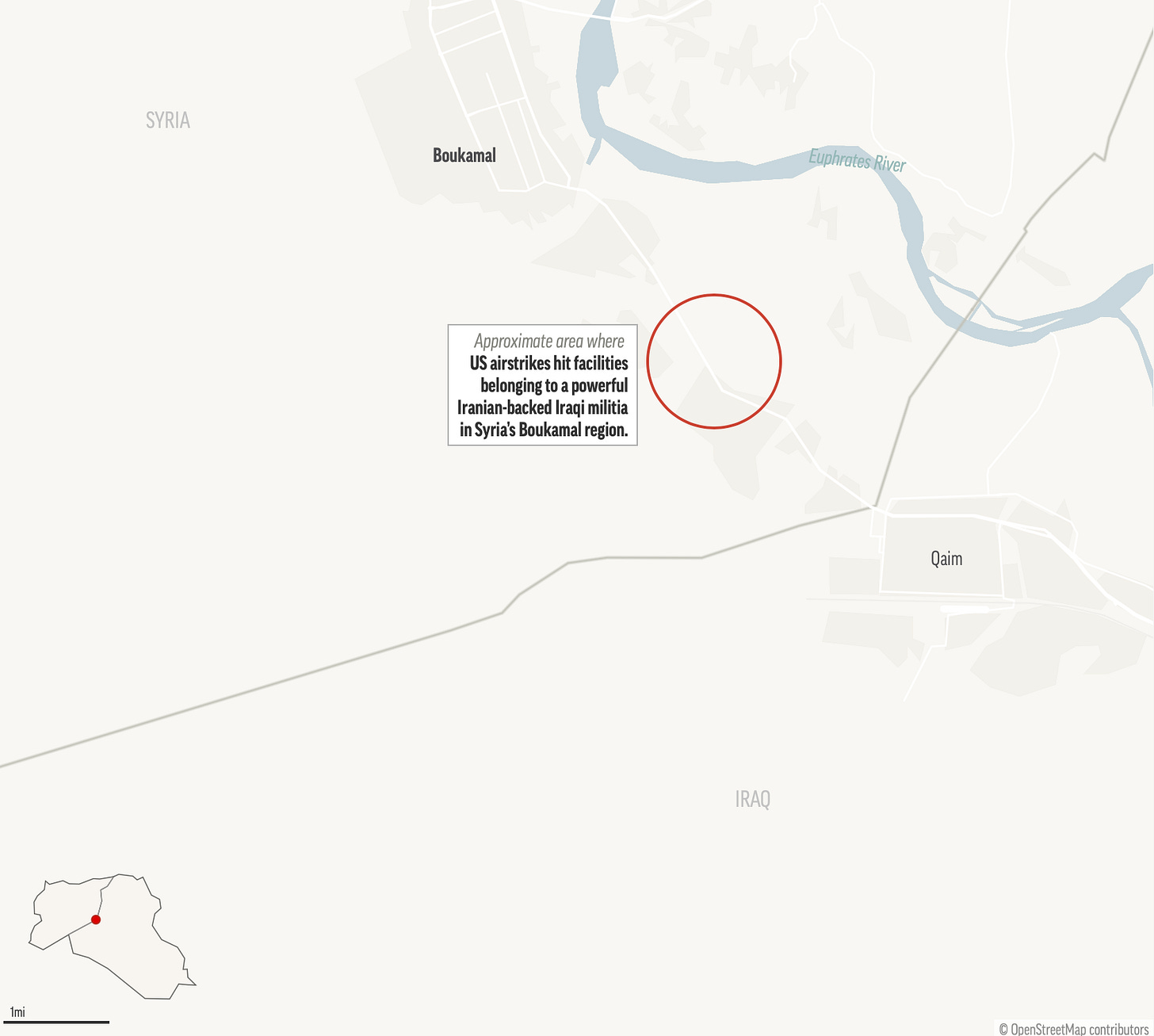So long, Tehran. We hardly knew you
An airstrike in Syria reveals how dead the Iran deal truly is
Twitter was set aflame by opinions about the latest US airstrike in Syria ordered by president Biden. As the official story goes, Iraqi intelligence provided to the US military linked Iran to rocket attacks on US and coalition facilities in Iraq, thus prompting a retaliatory response that has been justified, in part, by invoking UN rules and guidelines of dubious applicability about self-defense for troops who are already deployed to Syria without legal authorization and lack the legal authority to fire back at Iranian troops in the first place. You know it’s bad news when the Pentagon Press Secretary is saying “we’re confident that these were legitimate targets” and proclaiming self-defense for a preemptive offensive action.
Israeli officials have briefed that they’re pleased with the strike and that “Biden is not Obama.” Given that the US announcement that MbS was responsible for the murder of Jamal Khashoggi and complete lack of any accompanying sanction on MbS goes to show that the song and dance around US policy continues apace under Biden without change. Of course, reporting is also out that mass shooter on the US navy base in Pensacola had help from Saudi Arabia (corroborated from prior reporting, by the way), but still, the best the Biden administration can muster is generic talk of ‘recalibrating’ the relationship with Riyadh. Now that Biden has shown he’s willing to strike Iranian targets in Syria in the same manner Israel has for nearly 2 years now, hardliners in Tehran preparing for a presidential election in June will have all the more ammunition to argue against any conciliatory steps to return to the Iran deal.
The strike is a political Rorschach test in Washington: those who’ve constantly pined for more military action see it as legitimate resolve, those disinterested or unsure don’t think much at all, and those following the conflict closely recognize that it establishes a new MO for Biden’s policy with likely disastrous diplomatic consequences. The increased NATO deployment to Iraq was the first sign that this administration intends to expand the conflicts that Trump left simmering and build on his regional policy. This strike is confirmation that the liberal interventionist strain of thought within his foreign policy network and team may take a more prominent role. The strike in question took place considerably far from US positions near the border at Al-Tanf and in the northeast:
The Iraqi government announced earlier in January that it was plussing up on border security to fight ISIS, which is a fairly suspect motivation. ISIS had effectively been defeated at the end of 2017 — unlike Al Qaeda, its reliance on control of physical territory made it a sitting duck to coordinated action over time — and despite the warnings that a US withdrawal might lead to a resurgence of ISIS, the US never actually withdrew its troops. The British government is expanding what is effectively a prison facility ID’d for ISIS troops but clearly able to host fighters from other groups given just how difficult it is to verify identities and who’s fighting whom in practice because of sheer quantity of competing rebel and extremist groups fighting in Syria. The facility is to be expanded to prevent networks from coordinating while interned, but you’d think they’d have thought of that when they first built the place. Given that Boris Johnson desperately needs to bear hug the US on foreign policy matters to prove that the UK is a far more indispensable partner than anyone on the continent, I’m tempted to even see the decision in light of the airstrike as part of a broader commitment to escalate the conflict shared between Biden’s team and Westminster, but that’s just conjecture at this point.
Iran is now threatening to quit the International Atomic Energy Agency and the relevant oversight mechanisms for its nuclear program over a US push to censure Iran next week using the IAEA as a forum. The talks are effectively dead in the water now with a combination of questionable links being used with militias — every militia has its own motivations and while they may cooperate with Iran or even receive arms, they aren’t acting in Iran’s interests — and a diplomatic censure intended to embarrass Tehran so that it comes back to the table. It never worked with Trump even after he killed Soleimani, it won’t work now. Adding fuel to the fire, an Israeli cargo ship just reported being struck by an unexplained blast in the Gulf of Oman. If it’s Iranian retaliation, it sends a clear signal that the latest attack required a response. If it’s Israel setting up an incident — Saudi Arabia scrambled to do this during the tanker war on at least one occasion — then Biden’s plugged into the same policy pathway Trump established with his team. The French just deployed a carrier to the Eastern Med where it will presumably operate in support of NATO operations as needed until it moves into the Indian Ocean and Persian Gulf. Talk is cheap. Actions speak volumes. Biden’s Iran policy appears hostage not only to Israel and Saudi Arabia’s whims, but the revealed preferences of European governments to continue the same escalatory path with Iran in hopes of achieving a grander deal. That should worry everyone in the year ahead, particularly as Vice President Harris tries to establish her own foreign policy portfolio and credibility in what is clearly a ploy to prep her for a potential 2024 run. Things are going to get worse before they get better, if they ever do.
Like what you read? Pass it around to your friends! If anyone you know is a student or professor and is interested, hit me up at @ntrickett16 on Twitter or email me at nbtrickett@gmail.com and I’ll forward a link for an academic discount (edu accounts only!).




